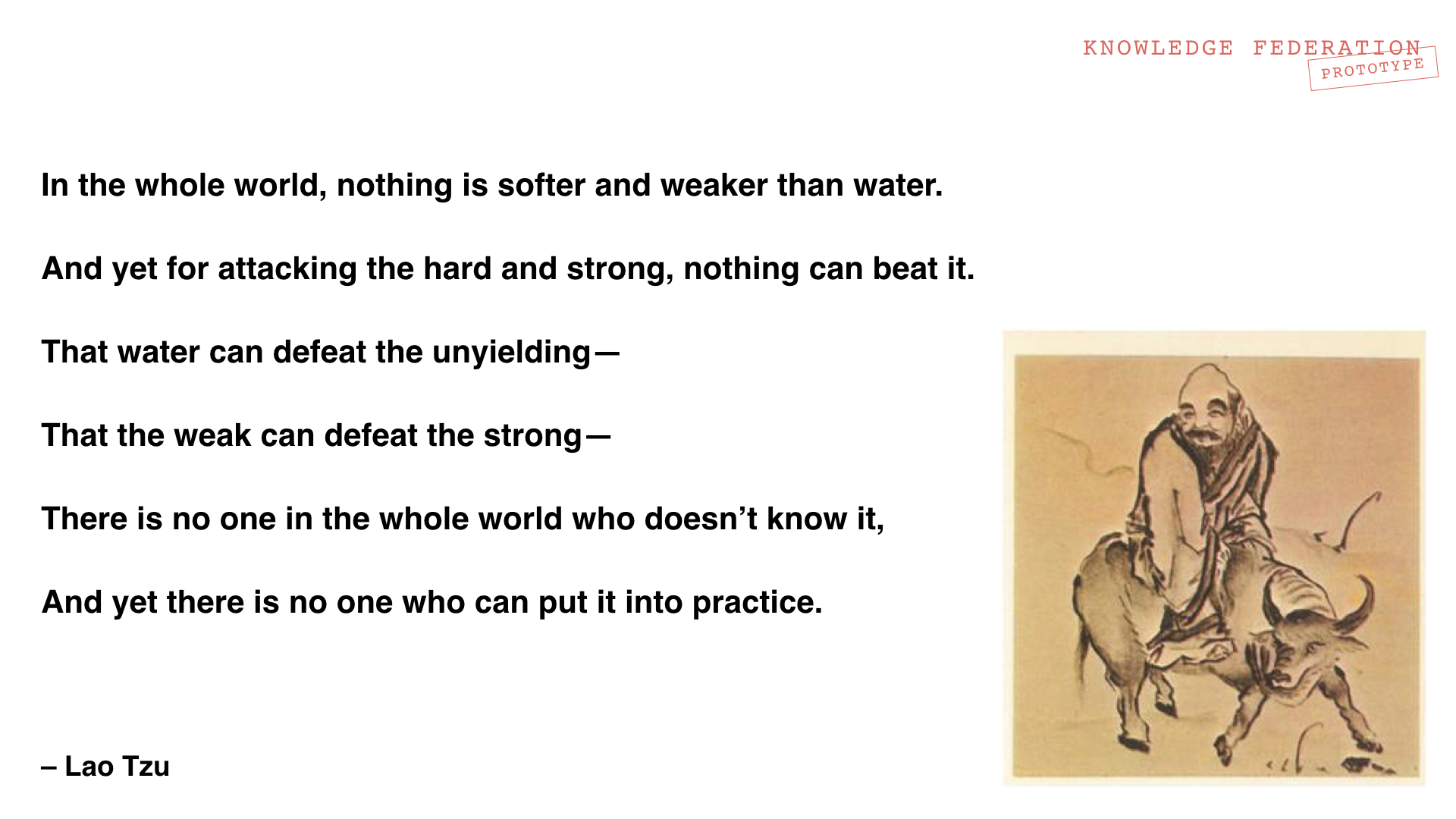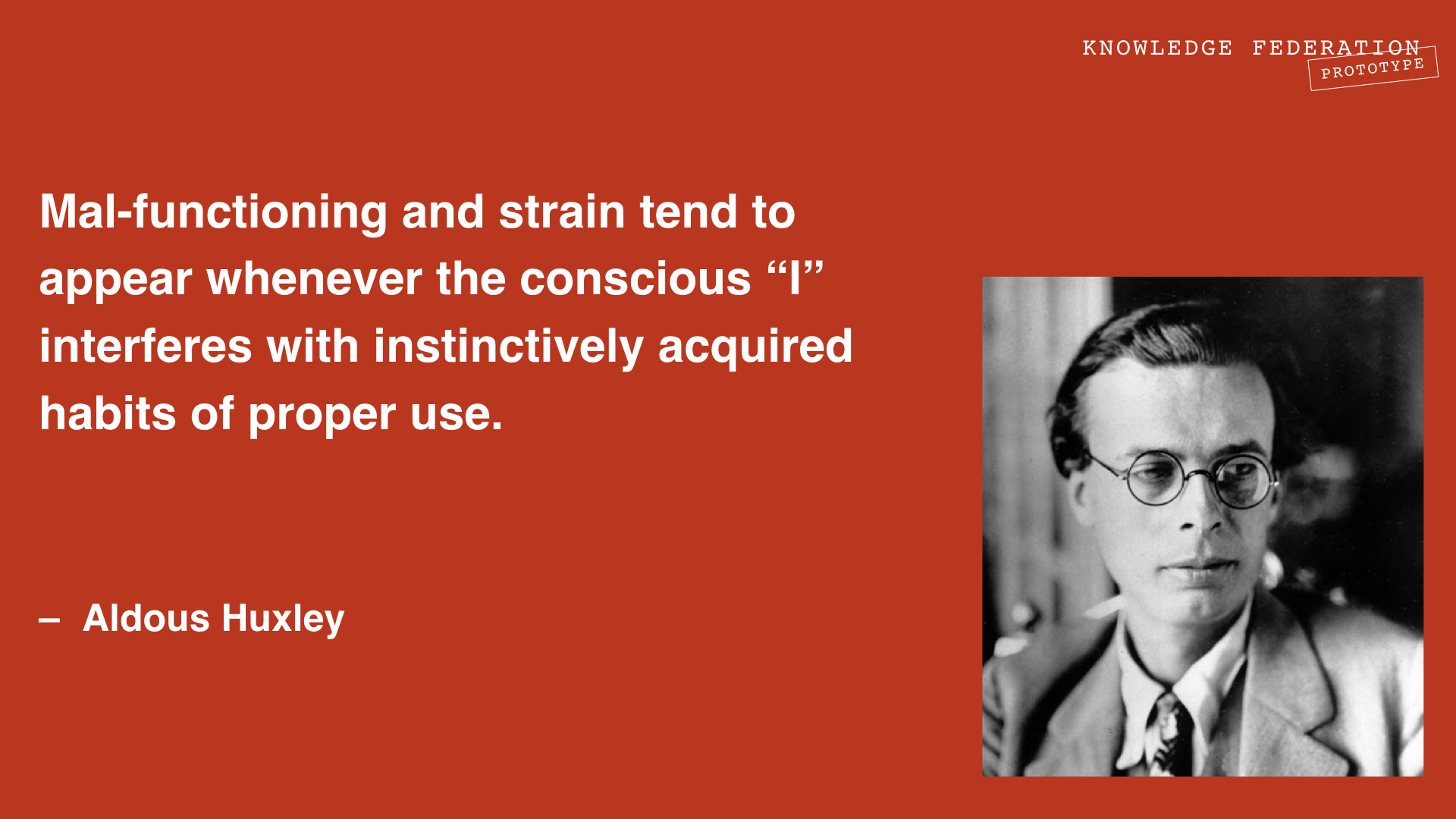Difference between revisions of "Holotopia"
m |
m |
||
| Line 14: | Line 14: | ||
</div> </div> | </div> </div> | ||
| − | <!-- | + | <!-- AAA |
| Line 668: | Line 668: | ||
<p>The <em>methodology</em> definition is conceived as a handful of crisp and very brief aphorismic axioms; by using [[truth by convention|<em>truth by convention</em>]], we gave them exact interpretation that is needed.</p> | <p>The <em>methodology</em> definition is conceived as a handful of crisp and very brief aphorismic axioms; by using [[truth by convention|<em>truth by convention</em>]], we gave them exact interpretation that is needed.</p> | ||
| − | <p>The first | + | <p>The first postulate defines <em>information</em> as "recorded experience". It is thereby made explicit that the substance communicated by information is not "reality", but human experience. Furthermore, since human experience can be recorded in a variety of ways (a chair is a record of human experience related to sitting and chair making), the notion of <em>information</em> vastly surpasses written documents. This first postulate enables <em>knowledge federation</em> across cultural traditions and fields of interests—by reducing everything to human experience, as common denominator. </p> |
| − | <p>The second | + | <p>The second postulate postulates that the [[scope|<em>scope</em>]] (the way we look) determines the <em>view</em> (what is seen). According to this axiom, in <em>polyscopy</em> the experience (and "reality" or whatever is "behind" experience) does not have an a priori structure. We <em>attribute</em> a structure to it with the help of our concepts and other elements of our <em>scope</em>. This postulate enables <em>scope design</em>—and the general-purpose science modeled by the <em>holoscope</em>. </p> |
<p>In <em>polyscopy</em> we did not talk about knowledge; <em>knowledge federation</em> was developed later. We may now improvise a new axiom.</p> | <p>In <em>polyscopy</em> we did not talk about knowledge; <em>knowledge federation</em> was developed later. We may now improvise a new axiom.</p> | ||
| Line 684: | Line 684: | ||
<p>A <em>methodology</em> allows us to state explicitly what information needs to be like; and what being "informed" means. We modeled this intuitive notion with the keyword [[gestalt|<em>gestalt</em>]]. To be "informed", one needs to have a <em>gestalt</em> that is appropriate to one's situation. "Our house is on fire" is a canonical example. The knowledge of <em>gestalt</em> is profoundly different from knowing only the data (the room temperatures, CO2 levels etc.). </p> | <p>A <em>methodology</em> allows us to state explicitly what information needs to be like; and what being "informed" means. We modeled this intuitive notion with the keyword [[gestalt|<em>gestalt</em>]]. To be "informed", one needs to have a <em>gestalt</em> that is appropriate to one's situation. "Our house is on fire" is a canonical example. The knowledge of <em>gestalt</em> is profoundly different from knowing only the data (the room temperatures, CO2 levels etc.). </p> | ||
| − | <p> | + | <p>How can we be uninformed—in the midst of all the information we have? For an intuitive explanation, imagine that you are talking on the phone with your neighbor, that he's at work and you are at home, and that you see that his house is on fire. Yet you talk to him about the sale in the neighborhood fishing equipment store (which interests your neighbor, because he's an avid fisherman. "One cannot not communicate", reads one of Paul Watzlawich's axioms of communication. Although when seen from a <em>factual</em> point of view nothing is wrong our media informing (and with your communication with your neighbor), in this <em>informed</em> approach to information we are proposing it is profoundly and dangerously deceptive, because it communicates a wrong <em>gestalt</em>. The situation we are in may now be understood as a result of such <em>traditional</em> or <em>factual</em> approach to public informing—as the bus with candle headlights metaphor might suggest.</p> |
<p><em>Polyscopy</em> offers a collection of techniques for communicating and 'proving' or <em>justifying</em> general or <em>high-level</em> insights and claims. <em>Knowledge federation</em> is conceived as the social process by which such insights can be created and maintained.</p> | <p><em>Polyscopy</em> offers a collection of techniques for communicating and 'proving' or <em>justifying</em> general or <em>high-level</em> insights and claims. <em>Knowledge federation</em> is conceived as the social process by which such insights can be created and maintained.</p> | ||
| Line 691: | Line 691: | ||
<p>This new approach to academic knowledge work we are proposing, where instead of relying on inherited interests and methods we <em>federate</em> a <em>methodology</em>, is a practical way to respond to the demand for academic <em>accountability</em>, which, we proposed, follows from the situation the academic tradition now finds itself in. And indeed in two ways. It allows us to vastly <em>broaden</em> the scope of academic work, by using the <em>methodology</em> to create new kinds of results—according to the contemporary needs of people and society. <em>And</em> it allows us to <em>define</em> what "scientific thinking" and "scientific worldview" are truly about—in a way that can be read and understood; and in a way that <em>evolves</em>, and remains in sync with the <em>contemporary</em> state of the art of academic <em>knowledge of knowledge</em>.</p> | <p>This new approach to academic knowledge work we are proposing, where instead of relying on inherited interests and methods we <em>federate</em> a <em>methodology</em>, is a practical way to respond to the demand for academic <em>accountability</em>, which, we proposed, follows from the situation the academic tradition now finds itself in. And indeed in two ways. It allows us to vastly <em>broaden</em> the scope of academic work, by using the <em>methodology</em> to create new kinds of results—according to the contemporary needs of people and society. <em>And</em> it allows us to <em>define</em> what "scientific thinking" and "scientific worldview" are truly about—in a way that can be read and understood; and in a way that <em>evolves</em>, and remains in sync with the <em>contemporary</em> state of the art of academic <em>knowledge of knowledge</em>.</p> | ||
| − | <p>This approach is similar to dynamics that led to the emergence of science in Galilei's time—where a certain methodological idea, developed in astrophysics, ended up defining a <em>general</em> approach to knowledge in the sciences. | + | <p>This approach is similar to the dynamics that led to the emergence of science in Galilei's time—where a certain methodological idea, developed in astrophysics, ended up defining a <em>general</em> approach to knowledge in the sciences. To create the <em>polyscopy</em> as a <em>prototype</em> of a <em>general-purpose methodology</em> we <em>federated</em> methodological insights and techniques across the board:</p> |
| + | <ul> | ||
| + | <li>[[pattern|<em>Patterns</em>]] have a closely similar function as mathematics does in traditional sciences—and at the same time completely generalize the implementation of this function</li> | ||
| + | <li>[[ideogram|<em>Ideograms</em>]] allow us to include the expressive power and the insights and techniques from art, advertising and information design</li> | ||
| + | <li>[[vignette|<em>Vignettes</em>]] implement the basic technique from media informing, where an insight or issue is made accessible by telling illustrative and engaging or "sticky" real-life people and situation stories</li> | ||
| + | <li>[[thread|<em>Threads</em>]] implement Vannevar Bush's technical idea of "trails" as a way to combine specific ideas into higher-level units of meaning</li> | ||
| + | <ul> | ||
| + | |||
| + | |||
| + | <p>The following [[vignette|<em>vignette</em>]] will further illustrate the nuances of this approach, by explaining how a single specific methodological idea—the object oriented methodology in computer programming—has been <em>federated</em>.</p> | ||
<p>A situation with overtones of a crisis, closely similar to the one we now have in our handling of information at large, arose in the early days of computer programming, when the buddying industry undertook ambitious software projects—which resulted in thousands of lines of "spaghetti code", which nobody was able to understand and correct. [https://holoscope.info/2019/02/07/knowledge-federation-dot-org/#InformationHolon The story] is interesting, but here we only highlight the a couple of main points and lessons learned.</p> | <p>A situation with overtones of a crisis, closely similar to the one we now have in our handling of information at large, arose in the early days of computer programming, when the buddying industry undertook ambitious software projects—which resulted in thousands of lines of "spaghetti code", which nobody was able to understand and correct. [https://holoscope.info/2019/02/07/knowledge-federation-dot-org/#InformationHolon The story] is interesting, but here we only highlight the a couple of main points and lessons learned.</p> | ||
| Line 700: | Line 709: | ||
<p>They are drawn from the "object oriented methodology", developed in the 1960s by Old-Johan Dahl and Krysten Nygaard. The first one is that—to understand a complex system—<em>abstraction</em> must be used. We must be able to <em>create</em> concepts on distinct levels of generality, representing also distinct angles of looking (which, you'll recall, we called <em>aspects</em>). But that is exactly the core point of <em>polyscopy</em>, suggested by the methodology's very name.</p> | <p>They are drawn from the "object oriented methodology", developed in the 1960s by Old-Johan Dahl and Krysten Nygaard. The first one is that—to understand a complex system—<em>abstraction</em> must be used. We must be able to <em>create</em> concepts on distinct levels of generality, representing also distinct angles of looking (which, you'll recall, we called <em>aspects</em>). But that is exactly the core point of <em>polyscopy</em>, suggested by the methodology's very name.</p> | ||
| − | <p> | + | <p>Let us here highlight is is the <em>academia</em>'s accountability for the method. Any sufficiently complete programming language, even the "machine language" of the computer, will allow the programmers to create <em>any</em> sort of program. The creators of the "programming methodologies", however, took it upon themselves to provide the programmers the kind of programming tools that would not only enable them, but even <em>compel</em> them to write comprehensible, reusable, well-structured code. |
</div> </div> | </div> </div> | ||
| Line 732: | Line 741: | ||
<b>To be continued...</b> | <b>To be continued...</b> | ||
| − | + | BBB --> | |
| − | |||
<div class="row"> | <div class="row"> | ||
| Line 800: | Line 808: | ||
</div> </div> | </div> </div> | ||
| + | <!-- XXX | ||
<div class="row"> | <div class="row"> | ||
Revision as of 09:14, 28 August 2020
Contents
HOLOTOPIA
An Actionable Strategy
Imagine...
You are about to board a bus for a long night ride, when you notice the flickering streaks of light emanating from two wax candles, placed where the headlights of the bus are expected to be. Candles? As headlights?
Of course, the idea of candles as headlights is absurd. So why propose it?
Because on a much larger scale this absurdity has become reality.
The Modernity ideogram renders the essence of our contemporary situation by depicting our society as an accelerating bus without a steering wheel, and the way we look at the world, try to comprehend and handle it as guided by a pair of candle headlights.
Scope
In this last of the five insights we take up perhaps the most interesting question that remained:
Why is "a great cultural revival" realistically possible?
Why is the holotopia a better alternative? What is to be gained by "changing course"—and instead of reaching out for all the fun and pleasurable things that an advanced material civilization has to offer—engage in something as elusive and distant as "human development"?
In Galilei's time, concern with the "original sin" and "eternal punishment" were soon to be replaced; happiness and beauty would be lived here and now, and elevated and celebrated by the arts. What might the next "great cultural revival" be like?
Diagnosis
We (the power structures we compose) have done the same to culture and to ourselves, as we did to natural environment.
With one notable difference.
We do not have 'a science of culture'—which would give us the equivalent of the temperature and the CO2 measurements, so that we may even hope to turn this into an issue!
By looking at the world through the narrow frame, by seeing the world as a machine and focusing on immediate causality, we have made convenience (or "instant gratification") the value that orients our private pursuits; and egotism (or "egocenteredness") the value that orients our social ones.
Our point here will be that this is not only leading us into a trap through the social and natural "feedback loops", as we have already seen—but also directly, by separating us from the kind of happiness and fulfillment that only culture, and "human development" can lead to.
Remedy
Here too there is an insight, a rule of thumb, that reverses our "pursuit of happiness" quite thoroughly; and leads us to a realm of fulfillment that most of us consider possible.
We've called it "the best kept secret of human culture", and offered it for dialog and elaboration as one of our selected ten themes.
Long story short—there is an incomparably better way to be human, than what we've known and experienced.
This is what attracted our distant ancestors to persons like the Moses, the Buddha, the Christ or Mohammad. Yet always—the power structure managed to divert the way they were pointing to into something quite different, and at not rarely into its very opposite!
So what can we do that is different?
We can introduce knowledge of knowledge; offer, and teach information about information. We can create a communication channel, which is wide enough and clear enough for these things to be seen!
As soon as we begin to do that, to federate suitable insights to illuminate that realm of possibilities, the convenience paradox is clearly seen.
The convenience paradox insight is that convenience is a deceptive and useless value, behind which enormous cultural opportunities have remained hidden. The idea of a "couch potato" provides a common-sense illustration—but, we show, the depth and breadth of possibilities for improving our condition through long-term cultivation is beyond what most of us will dare to consider possible.
Human wholeness does exist; and it feels, and looks, incomparably better than most of us will dare to imagine. It is this that drove people to the Buddha, Christ, Mohammed and other founders of religion. We represent them all here by Lao Tzu, who is often considered the founder of "Taoism". "Tao" literally means "way". The point here is to develop one's way of live, and culture, based on on where the way is leading to—and not (only) based on how attractive a direction may feel at the moment.
The most fascinating insight is reached as soon as we ignore the differences in worldview, what the adherents of different religion "believe in"—and pay attention to the symbolic environment they produce, and the kind of values and way of being they nourish. Compare, for instance, the above Lao Tzu's observations with what Christ told his disciples in the Sermon on the Mount.
Most interestingly, even a superficial federation (when we no longer focus on what religious traditions "believe in", but on the symbolic environments they create and the values they promote) the transcendence of egotism is a key element of the "way".
Lao Tzu is often pictured as riding a bull, which signifies that he conquered and tamed his ego. We here quote Aldous Huxley, to point out that transcending egotism is so much part of our wholeness, that even physical effort and effortlessness—which we now handle exclusively by developing the technology—is conditioned by it.
Motivation: Bauman's "Cuture as praxis". Definition of culture as "cultivation of wholeness.
Definition of religion as "reconnection with archetypes".
The book "Liberation" subtitled "Religion beyond Belief" is an ice breaker. It federates "the best kept secret", and creates a dialog.
Movement and Qi is a template how to put the language of "movement" (doing something with the body) into the academic repertoire. And how to put the heritage of the world traditions such as yoga and qigong into academic repertoire.



